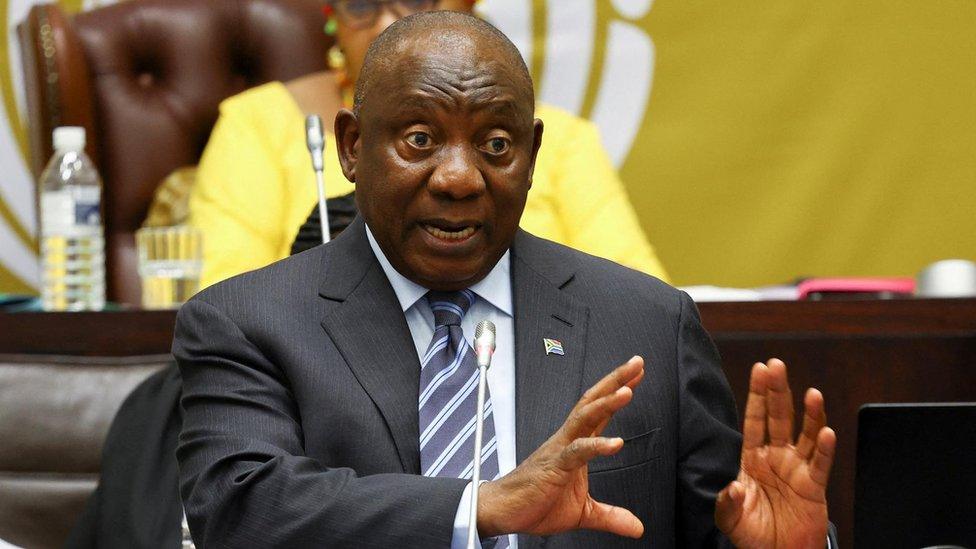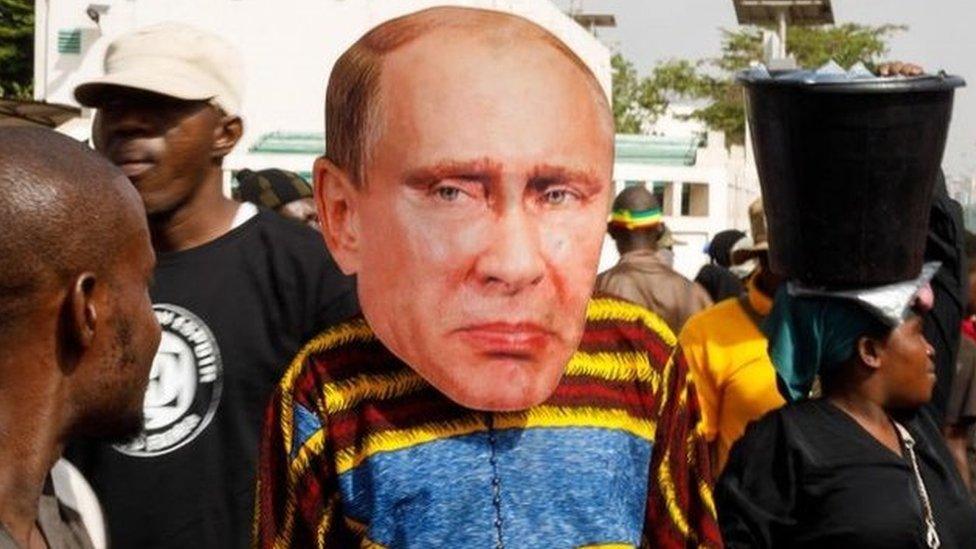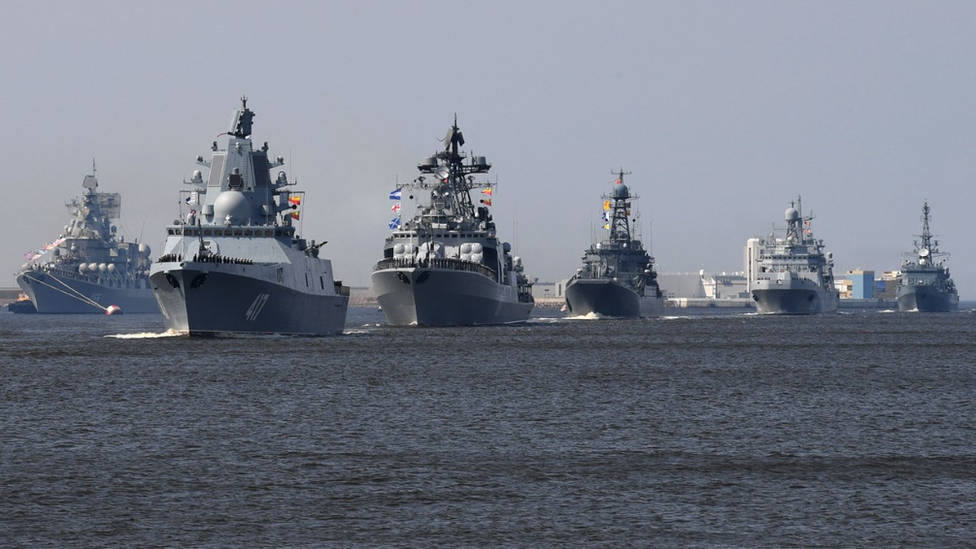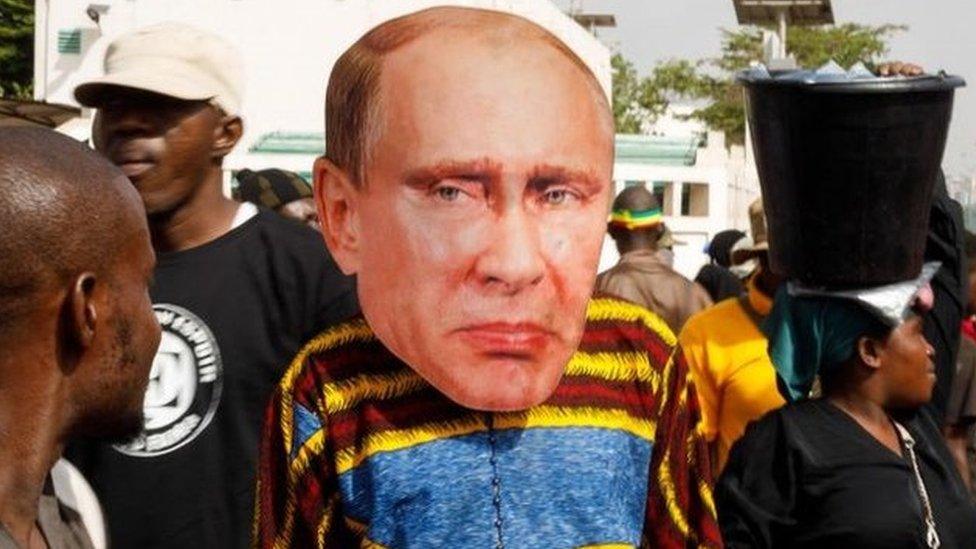South Africa supplied arms to Russia - US ambassador Reuben Brigety
- Published

The Russian fleet sent to South Africa for naval exercises was led by the Admiral Gorshkov warship, seen here in Cape Town in February
The US ambassador to South Africa has accused the country of supplying weapons to Russia despite its professed neutrality in the war in Ukraine.
Reuben Brigety claimed that a Russian ship was loaded with ammunition and arms in Cape Town last December.
President Cyril Ramaphosa's office said it was disappointed by the claims and said no evidence has been provided to support them.
The country has maintained claims of neutrality in the invasion of Ukraine.
Mr Brigety said at a media briefing in Pretoria on Thursday that Washington had concerns about the country's stated non-aligned stance on the conflict.
He referred to the docking of a cargo ship in the Simon's Town naval base between 6 and 8 December last year which he was "confident" uploaded weapons and ammunition "as it made its way back to Russia".
The presence of the ship, the Lady R, had seemed curious at the time and raised questions from some local politicians.
"The arming of the Russians is extremely serious, and we do not consider this issue to be resolved," Mr Brigety said, in a damning accusation that seems to have caught South Africa's officials off guard.
In the wake of the allegations, the South African government announced the establishment of an independent inquiry led by a retired judge, a spokesman for the president's office said.
The US has been critical for months about South Africa's continued cosy relationship with Russia.
State Department deputy spokesman Vedant Patel told journalists on Thursday that the US had previously raised concerns about the Lady R with numerous South African officials.
He said the US would speak out against "any country taking steps to support Russia's illegal and brutal war in Ukraine", but would not say whether there would be any repercussions for South Africa if the claims proved to be true.
Washington has also expressed concerns about South Africa's participation in military exercises with Russia and China during the anniversary of the invasion of Ukraine.

South African President Cyril Ramaphosa told parliament his government was looking into the claims
The naval exercises took place over 10 days in February and were criticised by opposition figures as an endorsement of the Russian invasion.
The South African authorities denied the war games were provocatively timed to coincide with the one-year anniversary and said the country routinely hosts similar drills with other nations, including France and the US.
South Africa previously abstained from a UN vote condemning the invasion. It also refused to join the US and Europe in imposing sanctions on Russia.
In response to a question raised by the leader of the opposition John Steenhuisen, President Ramaphosa told parliament on Thursday that the comments made by the US ambassador would be looked into.
The president asked opposition parties to allow for the process to be completed, adding that "in time we will be able to speak about it".
If the claims are true, they not only weaken South Africa's claim of neutrality, but some may even go as far as saying the country is complicit in the ongoing aggression of Russia in Ukraine.
"If South African bullets are found on Ukraine bodies, that is not a position we would want to be in," one expert in international relations said.
The details around the arms cache are still thin. It is not clear if the weapons would have been acquired from a state-owned arms company, or a weapons company based in South Africa.
But either way, this does not bode well for South Africa's international ties, especially with the US, one of its largest trade allies.
At the heart of the issue for South Africa now, off the back of these claims, will be the impression this could create that the country is not only non-aligned but has in fact chosen to be a "soft ally" to Russia, at a time when some Western countries see Russia as an aggressor guilty of human rights violations.
South Africa has modern-day ties with Russia because they are members of the Brics alliance, a group which represents some of the world's leading emerging economies, including China, Brazil and India.
The country's governing African National Congress (ANC) also has long-standing ties with Russia.
South Africa was faced with a diplomatic dilemma in March after the International Criminal Court (ICC) issued an arrest warrant against Russian President Vladimir Putin.
He is accused of being responsible for war crimes in Ukraine, including the unlawful deportation of children.
Mr Putin was due to attend an upcoming Brics summit in South Africa in August but the warrant meant that Pretoria would have to detain him on arrival.
In response, last month Mr Ramaphosa said the ANC had decided that South Africa should quit the ICC, before backtracking hours later citing what his office called a communications "error".
Historically, South Africa had a thriving arms industry, selling weapons to countries across the continent. The scale of that arms power to date is currently not known.
South Africa's authorities have been less than pleased with the accusation from the US ambassador, saying the matter should have been handled through proper diplomatic channels.
It is not enough for the envoy to simply claim the existence of the intelligence and there will be an expectation from many in South Africa for the US to provide evidence of its claim.
This is a hang-over from claims once made by the US of weapons of mass destruction, which led to the invasion of Iraq some years ago.
Related topics
- Published25 February 2023

- Published17 February 2023

- Published22 June 2022
